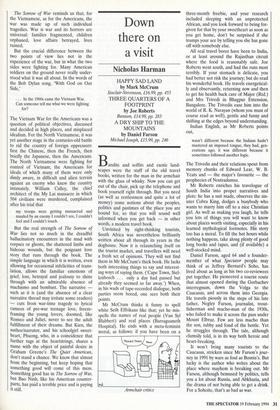Down there on a visit
Nicholas Harman
Bandits and soffits and exotic land- scapes were the stuff of the old travel books, written for the man in the armchair with the glass of whisky. Now you can get out of the chair, pick up the telephone and book yourself right through. But you need (as well as restlessness and quite a lot of money) some notions about the peoples, politics and pastimes of the place you are bound for, so that you will sound well informed when you get back — in other words, a modern travel book.
Unvisited by right-thinking tourists, South Africa was nevertheless brilliantly written about all through its years in the doghouse. Now it is relaunching itself on the tourist market, and travellers will need a fresh set of opinions. They will not find them in Mr McCrum's thick book. He lacks both interesting things to say and interest- ing ways of saying them. (`Cape Town, Stel- lenbosch . . . only a day had passed but already they seemed so far away.') When, in his wads of tape-recorded dialogue, both parties seem bored, one sees both their points.
Mr McCrum thinks it funny to spell white Seth Effrikans like that; yet he mis- spells the names of real people (Van Syl Blabbers) and real places (Barraguaneth Hospital). He ends with a meta-feminist moral, as follows: if you have been on a Armchair critics three-month freebie, and your research included sleeping with an unprotected African, and you look forward to being for- given for that by your sweetheart as soon as you get home, don't be surprised if she trumps your ace by telling you she has gone off with somebody else.
All real travel bores have been to India, or at least around the Rajasthan circuit where the food is reasonably safe. Joe Roberts went south, and had the runs most terribly. If your stomach is delicate, you had better not risk the journey; but do read his wonderful book. He travels energetical- ly and observantly, returning now and then to get his health back care of Major (Rtd.) and Mrs Trivedi in Bhagpur Extension, Bangalore. The Trivedis ease him into the world of R. K. Narayan (whom you must of course read as well), gentle and funny and shifting at the edges beyond understanding.
Indian English, as Mr Roberts points out,
wasn't different because the Indians hadn't mastered an imposed tongue, they had, gen- erations ago; it was different because it sometimes followed another logic.
The Trivedis and their relations spout from memory chunks of Edward Lear, W. B. Yeats and — the major's favourite — the prophecies of Nostradamus.
Mr Roberts enriches his travelogue of South India into proper narratives and plots: he has a suit made, observes the sin- ister Cobra King, dodges a busybody who wants to marry him off to a nice Christian girl. As well as making you laugh, he tells you lots of things you will want to know about places worth visiting, especially in his learned mythological footnotes. His story too has a moral. To fill the hot hours while nothing happens, take along plenty of good long books and tapes, and (if available) a well-stocked mind.
Daniel Farson, aged 64 and a founder- member of what Spectator people may think of as Jeffrey Bernard's Soho, has lived about as long as his two co-reviewees put together. He pioneered a tourist route that almost opened during the Gorbachev interregnum, down the Volga to the Caucasus, and across them into Georgia. He travels piously in the steps of his late father, Negley Farson, journalist, trout- fisherman and macho-man of the 1930s, who failed to make it across the pass under Mount Elbruz. Few are less macho than the son, tubby and fond of the bottle. Yet he struggles through. The tale, although clumsily told, is in its way both heroic and heart-breaking.
It won't bring many tourists to the Caucasus, stricken since Mr Farson's jour- ney in 1991 by wars as foul as Bosnia's. But lucky is the author who writes about the place where mayhem is breaking out. Mr Farson, although bemused by politics, tells you a lot about Russia, and Abkhazia, and the drama of not being able to get a drink. For a Sohoite, that's as bad as war.


















































 Previous page
Previous page